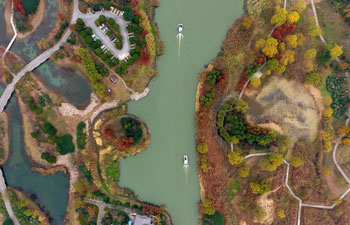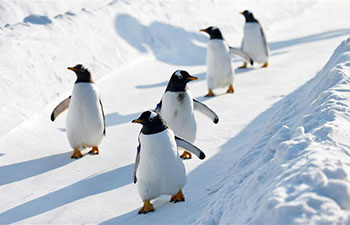WASHINGTON, Jan. 5 (Xinhua) -- Reducing climate uncertainty, improving weather forecasts and understanding sea-level rise are among top science priorities identified by a much-anticipated report out Friday for U.S. Earth-observing missions for the next decade.
NASA, the National Oceanic and Atmospheric Administration (NOAA), and the United States Geological Survey (USGS) should implement "a coordinated approach" for their space-based environmental observations in order to answer key scientific questions about our planet "with constrained resources," said the report released by the National Academies of Sciences, Engineering, and Medicine.
"Changes in climate, air quality, water availability, and agricultural soil nutrients are largely being driven by humans," Bill Gail, chief technology officer at the Global Weather Corporation and co-chair of the committee that conducted the study and wrote the report, said in a statement.
"Embracing this new paradigm of understanding a changing Earth and building a robust program to address it is a major challenge for the coming decade."
This is the second National Academies "decadal survey" for Earth science and applications from space.
Building on the first decadal survey, which was published in 2007, it identified a total of 35 key questions on Earth science and applications spanning the full range of Earth system science.
It called for NASA to develop five flagship missions in the coming decade, with two capped at 800 million U.S. dollars each, and the remaining three at 650 million dollars, 500 million dollars and 350 million dollars, respectively.
The two largest investments would target clouds and atmospheric particles called aerosols, which would in turn improve predictions of future weather and climate conditions.
The other three would aim to study changes on Earth's surface, including measuring ground water and water storage mass change and assessing ice sheet stability and the potential for ice sheets to make large rapid contributions to sea level rise.
The report said NASA has responded positively to its 2007 decadal survey, which recommended 15 missions for the agency.
But while NASA accepted and implemented most of the survey's recommendations, they were done at a slower pace than recommended for several reasons such as budget constraints and growth in cost estimates.
Whether the current U.S. administration will follow through on the recommendations is still unknown, given that President Donald Trump has been taking an apparently skeptical stance regarding many scientific issues, especially those around global warming.
Previously, the Trump administration proposed to cancel several of NASA's Earth science programs in its fiscal 2018 budget request.

















